By Khairul Khalid | Kinibiz
DECEMBER 22, 2015 8:00AM
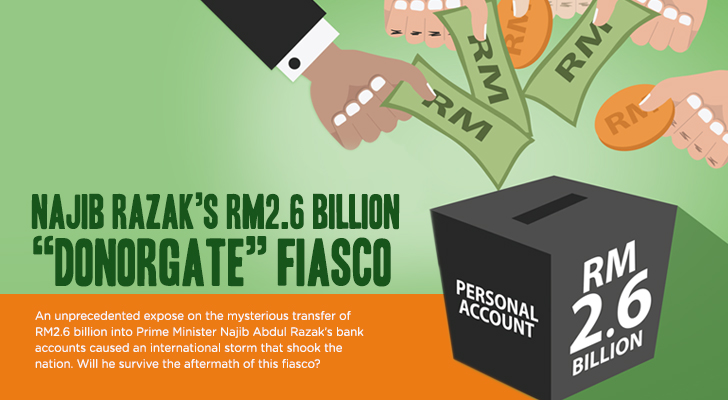
________________________________________________________________________
The sensational expose on a RM2.6 billion transfer into Prime Minister Najib Abdul Razak’s personal bank accounts rocked Malaysia in 2015. Will there be more twists and turns to the “Donorgate” scandal in 2016?
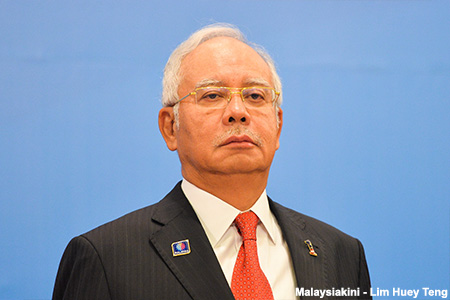 In 2015, “donations” took on new dimensions in the Malaysian lexicon. There are still more questions than answers about the RM2.6 billion transfer – purportedly from a mysterious Arab donor – directly to Prime Minister Najib Abdul Razak.
In 2015, “donations” took on new dimensions in the Malaysian lexicon. There are still more questions than answers about the RM2.6 billion transfer – purportedly from a mysterious Arab donor – directly to Prime Minister Najib Abdul Razak.
The shocking expose by the American newspaper Wall Street Journal (WSJ) last July is arguably the biggest bombshell ever dropped on a sitting Malaysian prime minister in recent memory.
Najib never denied transfer
The WSJ story revealed that Najib had received US$700 million (roughly RM2.6 billion at last July’s exchange rates) in his AmIslamic Bank accounts. These funds were transferred through several banks and companies, allegedly linked to 1MDB.
Although Najib initially threatened a lawsuit for the WSJ expose, no legal action has materialised so far. WSJ has stood firm by its story.
Since the RM2.6 billion story broke, the allegations stated in the WSJ story have never been directly disputed by the prime minister, who has only claimed that he did not take any funds for personal gain. He also stated vaguely that “I did not betray the country” and these allegations are “political sabotage”.
This month, Deputy Prime Minister Minister Ahmad Zahid Hamidi told the Parliament that the RM2.6 billion was a political donation. He said that the Malaysian Anti-Corruption Commission (MACC) confirmed this and had identified the donor.
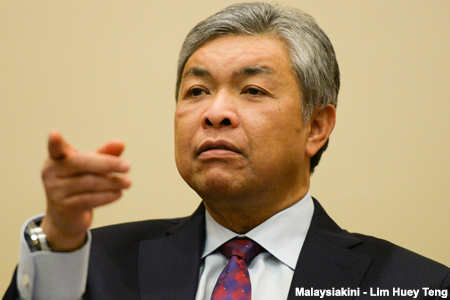 “Malaysia has no law that says political donations must be declared or to stop them,” said Zahid.
“Malaysia has no law that says political donations must be declared or to stop them,” said Zahid.
Zahid’s explanation was not well received. Many had anticipated Najib to personally clarify the issue. Minister Azalina Othman Said defended the PM’s absence, citing attorney-general Mohamed Apandi Ali’s advice for Najib not to address the RM2.6 billion issue personally in Parliament because it would be sub judice.
Sub judice means that a particular case or matter is under trial or being considered by a judge or court.
Funds linked to 1MDB?
According to WSJ, the bulk of the transfers came from two transactions of US$620 million and US$61 million (to make a total of US$681 million) in March 2013 ahead of the Malaysian general elections in May 2013.
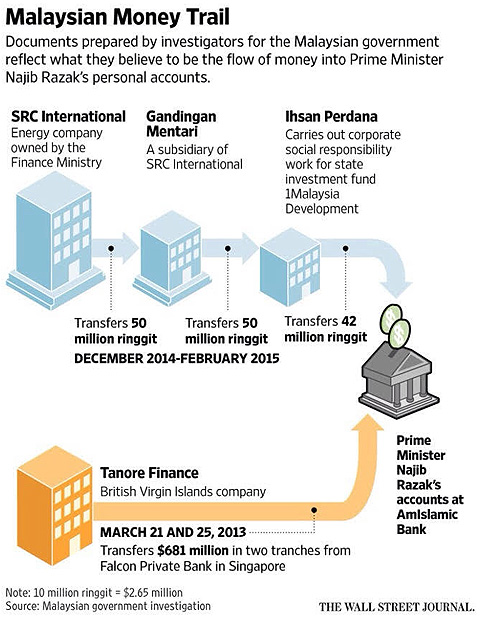 The report alleged that the transfers were made in two tranches from a British Virgin Island company called Tanore Finance Corp through Falcon Private Bank in Singapore.
The report alleged that the transfers were made in two tranches from a British Virgin Island company called Tanore Finance Corp through Falcon Private Bank in Singapore.
Falcon’s website says that since 2009, the Swiss-based private bank, founded in Zurich in 1965 as Ueberseebank and renamed AIG Private Bank in 1998, is owned by the International Petroleum Investment Co (IPIC) of Abu Dhabi.
“The cash came from a company registered in the British Virgin Islands via a Swiss bank owned by an Abu Dhabi state fund. The fund, IPIC, has guaranteed billions of dollars of 1MDB’s bonds and in May injected US$1 billion in capital into the fund to help meet looming debt repayments. A spokeswoman for IPIC couldn’t be reached for comment. The British Virgin Islands company, Tanore Finance Corp, couldn’t be reached,” the WSJ report said.
The report also said that RM42 million was transferred from SRC International, an energy company owned by the Finance Ministry and previously by 1MDB, through two intermediate transactions (see chart) to Najib’s accounts.
Unnamed Arab donors
However, about a month after the WSJ revelations, MACC all but confirmed the transfer, although its findings declared that the RM2.6 billion was political donations by unnamed donors from the Middle East, not 1MDB.
“Findings from report in relation to RM2.6 billion funds were handed over to the attorney-general, where the RM2.6 billion allegedly deposited into the prime minister’s personal accounts was merely from donors, in lieu of (from) 1MDB fund (sic),” said MACC in a statement.
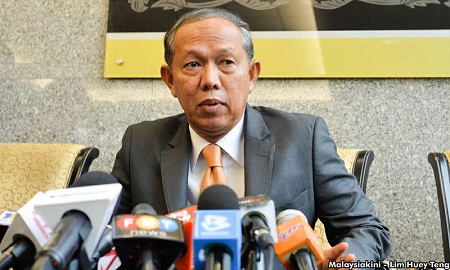 MACC did not explain how it came to these conclusions. In November, Public Accounts Committee chief Hasan Arifin also denied any links of the funds to the 1MDB controversy.
MACC did not explain how it came to these conclusions. In November, Public Accounts Committee chief Hasan Arifin also denied any links of the funds to the 1MDB controversy.
“The RM2.6 billion transferred into Prime Minister Najib Abdul Razak’s personal account is not related to 1MDB. I must say that 1MDB and the RM2.6 billion are entirely different subjects,” he told a press conference in Parliament.
Asked how he came to this conclusion, Hasan said this was in the auditor-general’s interim report on 1MDB. However, this report has not been made public, despite intense clamour to do so.
AmBank’s RM53 million penalty
In November, AmBank (the local bank that was allegedly the recipient of the RM2.6 billion transfer) suddenly announced that it was paying a massive penalty of RM53.7 million to Bank Negara Malaysia.
Was this massive fine related to transgressions on the RM2.6 billion transfer as many have speculated?
AmBank said that Bank Negara’s penalty was for non-compliance with “certain regulations”. On top of the fine, AmBank is setting aside RM100 million over four years to improve its processes and governance.
According to AmBank, the penalty was related to Section 234 of the Financial Services Act 2013 and Section 245 of the Islamic Financial Services Act 2013 respectively. Each Section empowers Bank Negara to take action, including the power to impose monetary penalty, if it finds non-compliance with the respective Act and associated regulations.
At the time of writing, neither AmBank nor Bank Negara has provided details of these non-compliances. But if Bank Negara was kept in the dark about the transfer, and AmBank had failed to declare the transaction, there is a strong chance that the hefty fine was linked to the RM2.6 billion.
Legal implications of “donation”
If true, what are the implications of such a “donation”, especially on a sitting prime minister?
Section 23(1) of the MACC Act states: “Any officer of a public body who uses his office or position for any gratification, whether for himself, his relative or associate, commits an offence.”
Under the heading “Presumption in certain offences”, Section 50(1) of the same Act states: “Where in any proceedings against any person for an offence under Section 16, 17, 18, 20, 21, 22 or 23 it is proved that any gratification has been received or agreed to be received, accepted or agreed to be accepted, obtained or attempted to be obtained, solicited, given or agreed to be given, promised or offered, by or to the accused, the gratification shall be presumed to have been corruptly received or agreed to be received, accepted or agreed to be accepted, obtained or attempted to be obtained, solicited, given or agreed to be given, promised or offered as an inducement or a reward for or on account of the matters set out in the particulars of the offence unless the contrary is proved.”
In other words, any payment made to a public official is assumed to be a gratification unless proven otherwise.
Najib has to prove that the RM2.6 billion is not a gratification. The MACC Act seems to indicate that even if that RM2.6 billion was a donation, there may still be grounds for prosecution.
The penalty for an offence under Section 23 is “imprisonment for a term not exceeding twenty years and a fine of not less than five times the gratification”. In this case, the penalty for the undisclosed RM2.6 billion donation may amount to a staggering RM13 billion.
GE13 could be invalid
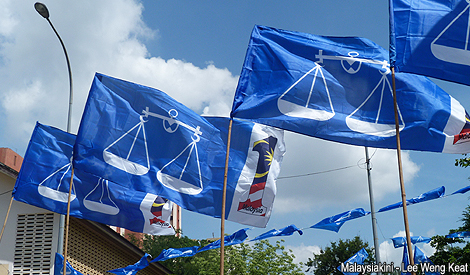 There are other political implications if the RM2.6 billion was used for the general election, as some leaders from Najib’s ruling political party Umno have claimed. The maximum that could be spent per candidate for any general election is only RM200,000 for a member of parliament and RM100,000 for a state assemblyman.
There are other political implications if the RM2.6 billion was used for the general election, as some leaders from Najib’s ruling political party Umno have claimed. The maximum that could be spent per candidate for any general election is only RM200,000 for a member of parliament and RM100,000 for a state assemblyman.
There are grounds for claims that the Election Offences Act may have been violated.
The worst case scenario is that if the RM2.6 billion was used entirely for elections, the whole of General Elections 2013 may be invalidated. If this is the case, it would have deep political ramifications on Najib’s grip on power.

#1 by Bigjoe on Tuesday, 5 January 2016 - 11:35 am
Today, Dr. M said it like I have been saying all along..
1MDB “rationalisation” plan is NOT rationalisation. Its debt repayment..In a rationalisation, you stream line your business to grow – you focus your business, exiting those that either contribute little, cannot grow or cannot grow. Paying off debt is done if its necessary..But the problem with 1MDB, its ALMOST THE ENTIRE THING – they sold what needed to pay debt, no matter what the business is.
“donorgate” may be more severe in its lies, breaking the law, institution but those things are older boundaries, established ones. Shocking it may be BUT allowing the likes of Arul Kandasamy and Najib to call their plan “rationalisation” is giving new boundaries to lie instead of making them more accountable..Its new territory for UMNO wrong ideology..